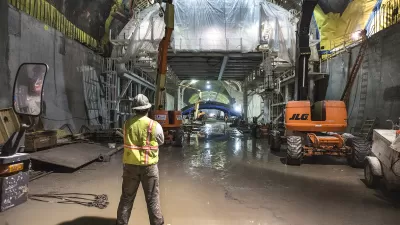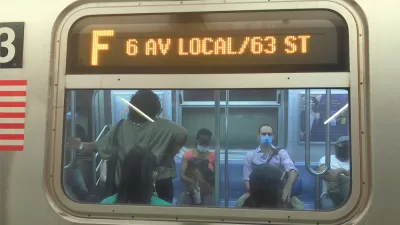With some of the highest per-mile costs in the world, the state wants more accountability for New York City's transit spending.

Clayton Guse reports that New York's Metropolitan Transportation Authority (MTA) is late on delivering a state-mandated report that compares its operating expenses with those of transit agencies in similar international cities.
Last year, after a Marron Institute study found that "MTA spends significantly more per mile of new subway track than any other transit agency on the planet," state legislators implemented a law requiring the MTA to provide a comparison with other modern transit systems in major international cities. The rule is "meant to encourage transit leaders to make sure they are properly spending the public’s money" by assessing how their daily operating expenses compare to "national and international peer cities."
After delaying the report for a year last January, the MTA missed the January 2021 deadline for submitting the report as well. State Senator Leroy Comrie (D-Queens) admonished the agency, stating "laws are not passed to be treated as suggestions." Given the MTA's massive expenditures and "immense strain" caused by the pandemic, monitoring operational efficiencies is "more important than ever," says Colin Wright, an advocacy associate with TransitCenter.
The MTA says it is "in the process of finalizing the report" and that it expects to cut $601 million in costs during 2021, though a spokesperson did not provide details on how the cost savings will be achieved.
FULL STORY: MTA ignores state mandate to compare sky-high costs with expenses of transit systems in other countries

Planetizen Federal Action Tracker
A weekly monitor of how Trump’s orders and actions are impacting planners and planning in America.

Maui's Vacation Rental Debate Turns Ugly
Verbal attacks, misinformation campaigns and fistfights plague a high-stakes debate to convert thousands of vacation rentals into long-term housing.

San Francisco Suspends Traffic Calming Amidst Record Deaths
Citing “a challenging fiscal landscape,” the city will cease the program on the heels of 42 traffic deaths, including 24 pedestrians.

Amtrak Rolls Out New Orleans to Alabama “Mardi Gras” Train
The new service will operate morning and evening departures between Mobile and New Orleans.

The Subversive Car-Free Guide to Trump's Great American Road Trip
Car-free ways to access Chicagoland’s best tourist attractions.

San Antonio and Austin are Fusing Into one Massive Megaregion
The region spanning the two central Texas cities is growing fast, posing challenges for local infrastructure and water supplies.
Urban Design for Planners 1: Software Tools
This six-course series explores essential urban design concepts using open source software and equips planners with the tools they need to participate fully in the urban design process.
Planning for Universal Design
Learn the tools for implementing Universal Design in planning regulations.
Heyer Gruel & Associates PA
JM Goldson LLC
Custer County Colorado
City of Camden Redevelopment Agency
City of Astoria
Transportation Research & Education Center (TREC) at Portland State University
Jefferson Parish Government
Camden Redevelopment Agency
City of Claremont





























